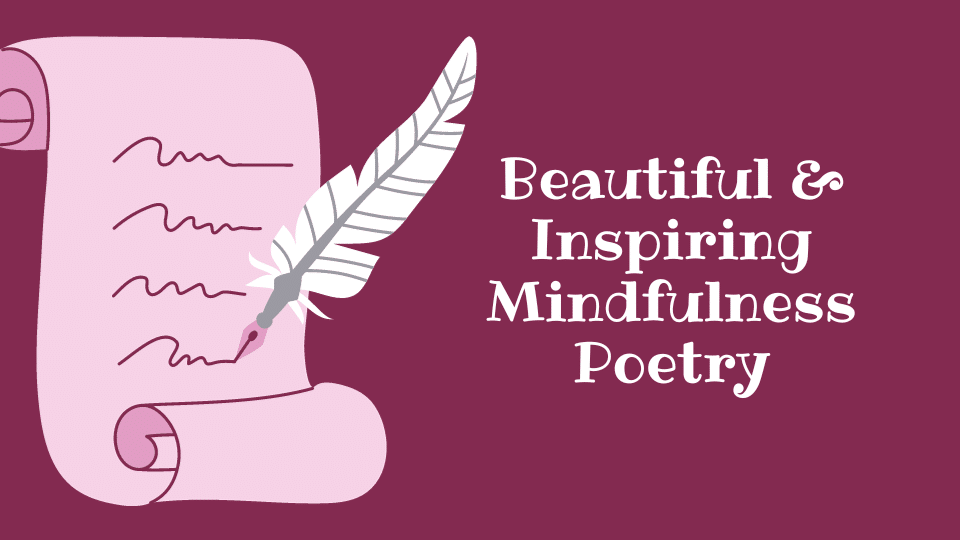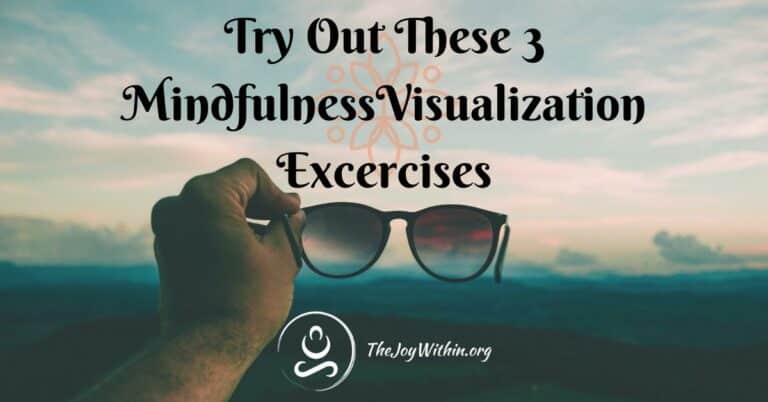If you have a mindfulness practice, you know the importance of taking time to step back and focus on being present in the moment.
There are many ways to do this, but one of my favorite practices is to take time to read a few poems. In this post, I’ll share a few tips to help you enjoy mindful poetry, as well as share a few beautiful and inspiring works you can read, right now.
Beautiful Mindfulness Poetry for Transformation and Living in the Present Moment
- Beautiful Mindfulness Poetry for Transformation and Living in the Present Moment
- How To Read Mindfulness Poetry
- 12 Poems About Mindfulness
- The Guest House by Rumi
- The Peace of Wild Things by Wendell Berry
- The Summer Day by Mary Oliver
- Kindness by Naomi Shihab Nye
- Silent Friend of Many Distances by Rainer Maria Rilke
- Keeping Quiet by Pablo Neruda
- In Blackwater Woods by Mary Oliver
- Pippa’s Song by Robert Browning
- Dust of Snow by Robert Frost
- Each Moment Is Precious by Patricia Fleming
- Seeker of Truth by e.e. cummings
- Happiness by Herman Hesse
How To Read Mindfulness Poetry
There are many beautiful poems about mindfulness you could choose from, and I believe that it doesn’t matter what poem you read, so much as how you read it.
Whenever I’m reading these types of poems, I like to use a technique I call Insight Reading.
Insight Reading is a reflective form of reading, in which you take plenty of time to read each phrase, allowing yourself space to process and internalize the phrases you’re reading.
It is a process that helps you to disengage from the logical mind, so while you read, your goal is not to “think about” the words you’re reading, or the meaning of the poem. Instead, set a goal to let the words “settle in” with you. I like the idea of “resting into” the phrases as I read.
This method allows you to enter into a deeper state of appreciation for the work, so you can feel the impact of the words on the page, rather than think about them.
Give it a try with the following poems.
12 Poems About Mindfulness
The Guest House by Rumi
This poem metaphorically explores the concept of welcoming all emotions and experiences as guests in the “guest house” of our minds.
This being human is a guest house.
Every morning a new arrival.
A joy, a depression, a meanness,
some momentary awareness comes
as an unexpected visitor.
Welcome and entertain them all!
Even if they are a crowd of sorrows,
who violently sweep your house
empty of its furniture,
still, treat each guest honorably.
He may be clearing you out
for some new delight.
The dark thought, the shame, the malice.
Meet them at the door laughing and invite them in.
Be grateful for whatever comes.
Because each has been sent
as a guide from beyond.
The Peace of Wild Things by Wendell Berry
Berry reflects on finding peace in nature, disconnecting from the anxieties of modern life, and connecting with the serenity of the wild.
When despair for the world grows in me
and I wake in the night at the least sound
in fear of what my life and my children’s lives may be
I go and lie down where the wood drake
rests in his beauty on the water, and the great heron feeds.
I come into the peace of wild things
who do not tax their lives with forethought
of grief. I come into the presence of still water.
And I feel above me the day-blind stars
waiting with their light. For the time
I rest in the grace of the world, and am free.
The Summer Day by Mary Oliver
Oliver’s poem encourages readers to appreciate the present moment and find purpose in their lives by asking, “Tell me, what is it you plan to do with your one wild and precious life?”
Who made the world?
Who made the swan, and the black bear?
Who made the grasshopper?
This grasshopper, I mean— the one who has flung herself out of the grass, the one who is eating sugar out of my hand, who is moving her jaws back and forth instead of up and down— who is gazing around with her enormous and complicated eyes.
Now she lifts her pale forearms and thoroughly washes her face.
Now she snaps her wings open, and floats away.
I don’t know exactly what a prayer is.
I do know how to pay attention, how to fall down into the grass, how to kneel down in the grass, how to be idle and blessed, how to stroll through the fields, which is what I have been doing all day.
Tell me, what else should I have done?
Doesn’t everything die at last, and too soon?
Tell me, what is it you plan to do with your one wild and precious life?
Kindness by Naomi Shihab Nye
Nye’s poem explores the transformative power of kindness and the importance of being present and open-hearted in our interactions with others.
Before you know what kindness really is
you must lose things,
feel the future dissolve in a moment
like salt in a weakened broth.
What you held in your hand,
what you counted and carefully saved,
all this must go so you know
how desolate the landscape can be
between the regions of kindness.
How you ride and ride
thinking the bus will never stop,
the passengers eating maize and chicken
will stare out the window forever.
Before you learn the tender gravity of kindness
you must travel where the Indian in a white poncho
lies dead by the side of the road.
You must see how this could be you,
how he too was someone
who journeyed through the night with plans
and the simple breath that kept him alive.
Before you know kindness as the deepest thing inside,
you must know sorrow as the other deepest thing.
You must wake up with sorrow.
You must speak to it till your voice
catches the thread of all sorrows
and you see the size of the cloth.
Then it is only kindness that makes sense anymore,
only kindness that ties your shoes
and sends you out into the day to gaze at bread,
only kindness that raises its head
from the crowd of the world to say
It is I you have been looking for,
and then goes with you everywhere
like a shadow or a friend.
Silent Friend of Many Distances by Rainer Maria Rilke
Rilke’s poem invites readers to embrace silence as a powerful source of introspection and self-discovery.
Silent friend of many distances, feel
how your breath enlarges all of space.
Let your presence ring out like a bell
into the night. What feeds upon your face
grows mighty from the nourishment thus offered.
Move through transformation, out and in.
What is the deepest loss that you have suffered?
If drinking is bitter, change yourself to wine.
In this immeasurable darkness, be the power
that rounds your senses in their magic ring,
the sense of their mysterious encounter.
And if the earthly no longer knows your name,
whisper to the silent earth: I’m flowing.
To the flashing water say: I am.
Keeping Quiet by Pablo Neruda
In this poem, Neruda contemplates the significance of silence and stillness in fostering understanding and unity among people.
Now we will count to twelve
and we will all keep still
for once on the face of the earth,
let’s not speak in any language;
let’s stop for a second,
and not move our arms so much.
It would be an exotic moment
without rush, without engines;
we would all be together
in a sudden strangeness.
Fishermen in the cold sea
would not harm whales
and the man gathering salt
would not look at his hurt hands.
Those who prepare green wars,
wars with gas, wars with fire,
victories with no survivors,
would put on clean clothes
and walk about with their brothers
in the shade, doing nothing.
What I want should not be confused
with total inactivity.
Life is what it is about…
If we were not so single-minded
about keeping our lives moving,
and for once could do nothing,
perhaps a huge silence
might interrupt this sadness
of never understanding ourselves
and of threatening ourselves with
death.
Now I’ll count up to twelve
and you keep quiet and I will go.
In Blackwater Woods by Mary Oliver
Oliver’s poem reflects on the cycle of life, death, and renewal, encouraging readers to appreciate the interconnectedness of all living things.
Look, the trees
are turning
their own bodies
into pillars
of light,
are giving off the rich
fragrance of cinnamon
and fulfillment,
the long tapers
of cattails
are bursting and floating away over
the blue shoulders
of the ponds,
and every pond,
no matter what its
name is, is
nameless now.
Every year
everything
I have ever learned
in my lifetime
leads back to this: the fires
and the black river of loss
whose other side
is salvation,
whose meaning
none of us will ever know.
To live in this world
you must be able
to do three things:
to love what is mortal;
to hold it
against your bones knowing
your own life depends on it;
and, when the time comes to let it go,
to let it go.
Pippa’s Song by Robert Browning
Robert Browning was a 19th century English poet, and in this poem, also called “The year’s at the spring,” he reflects on the perfection of the world we can appreciate everywhere in front of us.
The year’s at the spring
And day’s at the morn;
Morning’s at seven;
The hillside’s dew-pearled;
The lark’s on the wing;
The snail’s on the thorn;
God’s in His heaven—
All’s right with the world.
Dust of Snow by Robert Frost
The way a crow
Shook down on me
The dust of snow
From a hemlock tree
Has given my heart
A change of mood
And saved some part
Of a day I had rued.
Each Moment Is Precious by Patricia Fleming
Live in the moment,
Just take it all in.
Pay attention to everything,
Right there and right then.
Don’t let your mind wander
To what’s coming next.
Cherish this moment
And give it your best.
Don’t let tomorrow
Make you rush through today,
Or too many great moments
Will just go to waste.
And the person you’re with,
In that moment you share,
Give them all of your focus;
Be totally there.
Laugh till it hurts,
Let the tears drop.
Fill up each moment
With all that you’ve got.
Don’t miss the details;
The lesson is there.
Don’t get complacent;
Stay sharp and aware.
It can take but a moment
To change your life’s path.
And once it ticks by,
There is no going back.
In just 60 seconds,
You may make a new friend.
Find your true love,
Or see a life start or end.
You become who you are
In those moments you live.
And the growth’s not in taking
But in how much you give.
Life is just moments,
So precious and few.
Whether valued or squandered,
It’s all up to you!
Seeker of Truth by e.e. cummings
seeker of truth
follow no path
all paths lead where
truth is here
Happiness by Herman Hesse
If luck you chase, you have not grown
enough for happiness to stay,
not even if you get your way.
If, what you lost, you still bemoan,
and grasp at tasks, and dash and dart,
you have not known true peace of heart.
But if no wishes are your own,
and you don’t try to win the game,
and Lady Luck is just a name,
then tides of life won’t reach your breast
and all your strife
and all your soul will rest.




